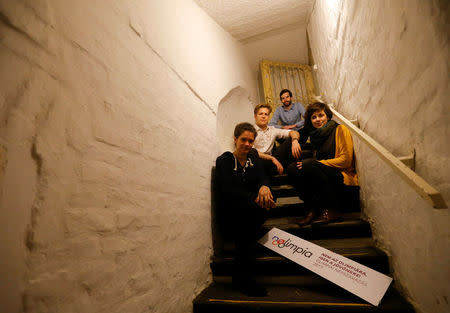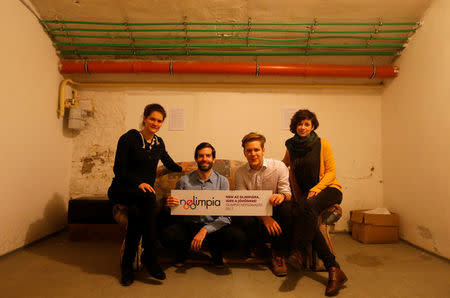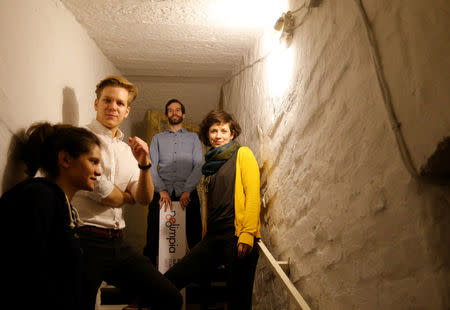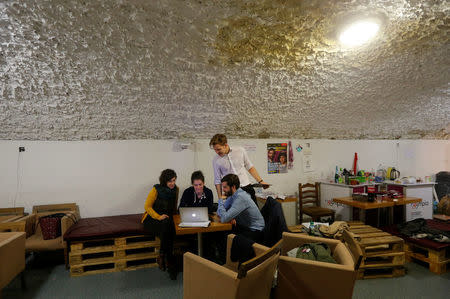After surprise victory over Olympic bid, young Hungarian group aims for parliament
By Krisztina Than BUDAPEST (Reuters) - Organising their campaign from a decrepit basement, a group of young professionals and students collected a quarter of a million signatures in a month to successfully force Budapest to abandon its bid to host the 2024 Olympics. And that could be just the start for a youth-oriented political movement that could be a new threat to right-wing Prime Minister Viktor Orban's dominance of Hungary. The group, Momentum, demanded a city-wide referendum in the capital on the Olympic bid and said Hungary wasn't yet rich enough to host it. It has now announced plans to set itself up as a political party next month and launch a campaign for parliament next year. Although it does not yet even register in polls, political analysts say it has a shot at winning seats at the expense both of both Orban's ruling Fidesz party and opposition groups that have faded as the prime minister has consolidated his power. No opposition group has had such an impact on a major issue since Orban rose to power in 2010 and began centralising control of the former Communist country in the hands of Fidesz. In challenging the Olympics, Momentum targeted an event seen as symbolically important to the prime minister, and which had support from most political parties when Hungary submitted its bid. Public support for hosting the Olympics appeared to vanish almost overnight during Momentum's campaign for the referendum, backed by 1,800 volunteers and around $60,000 in cash raised through crowdfunding on the Internet. Government spokesman Zoltan Kovacs told Reuters late on Wednesday that Hungary would withdraw its bid to host the games, following a meeting between Orban, the mayor of Budapest and the head of the Olympic committee. NEW ERA Momentum's leader, bearded lawyer Andras Fekete-Gyor, was born in 1989, the year Hungary escaped Communism, and says that revolution was never quite finished, leaving the country still in the grip of leaders with authoritarian instincts. "We think that the system change was in the end a failure, so it is not an accident that we are living now in an illiberal state in Hungary and that people want to leave," Fekete-Gyor said in an interview before the announcement that the Olympic bid would be withdrawn, sitting in a shabby armchair in the dim cellar. "We would like to start a new era." Momentum activists plan to travel around the country in coming weeks to establish action groups, seeking to broaden its appeal beyond its initial base of urban intellectuals. "We are not a left or right party ... we will have strong views on policy matters, we are going to start with healthcare," Fekete-Gyor said. As the latest among dissident political groupings that have sprung up across Europe to challenge the establishment, Momentum faces major hurdles if it hopes to translate its impact over the Olympics into wider political significance. Orban's party, Fidesz, has a strong lead in opinion polls, rival leftist parties are scrambling to poach floating voters, and the radical nationalist Jobbik party is moving towards the centre. But Momentum's focus on the Olympics proved "painful" for Fidesz, said Zoltan Novak, project director at the Centre for Fair Political Analysis, a Budapest think-tank. If Momentum can attract young voters "then they have a realistic chance of getting into parliament in 2018", Novak said. "We don't know at this stage how strong the movement is." DIVIDED NATIONAL UNITY The government dismisses Momentum's account of itself as a spontaneous civic-minded activist group. Government spokesman Kovacs said Momentum was created for political purposes and its anti-Olympic campaign had "divided national unity on the issue, and a large part of the opposition parties assisted in this". The group claims just 150 members, most, like its leader, in their late 20s or early 30s, born around the time when Orban himself was a young dissident making his mark with his Fidesz party as a fresh, liberal force confronting Communism. Fekete-Gyor holds a law degree from the same university as Orban, has studied in Germany and worked in Paris. He was just three months old when Orban delivered a landmark speech calling for the withdrawal of Russian troops. "I would have joined Fidesz at that time and then after a couple of years I would have left Fidesz," Fekete-Gyor said, referring to Orban's subsequent shift to the political right. Disappointment with cronyism and corruption in the government, and the short-sighted policies of opposition parties have driven hundreds of thousand of Hungarians abroad, he said. Momentum also campaigned in London, Brussels and other cities over the past month. Orban's Fidesz has a firm lead in polls, with 33 percent support, while Jobbik has 13 percent, and the Socialists, the biggest party on the left, 9 percent. There are enough undecided voters that there is room for a new group to grow. Still, Momentum will face a challenging environment in which Orban and Fidesz have strong control over the media. Launched in 2015, Momentum has organised summer camps to discuss policy issues. Its main challenge now will be to keep up the pace and publicity it gained with the referendum campaign, and appeal beyond Budapest to the countryside. "If not to Fidesz yet, Momentum will present an important challenge to the opposition parties in the coming period," said Attila Juhasz, an analyst at think-tank Political Capital. "But it will depend on how successfully they can build their organisation." Some leftist opposition parties helped Momentum collect signatures for their referendum campaign. But Momentum doesn't want to form an opposition coalition. "I would be satisfied if we made it into parliament," said another leading member of Momentum, Anna Orosz. "That is our goal, we want to be a strong opposition party." (Reporting by Krisztina Than; editing by Giles Elgood and Peter Graff)

 Yahoo News
Yahoo News 







